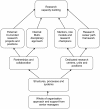A thematic analysis of the role of the organisation in building allied health research capacity: a senior managers' perspective
- PMID: 22920443
- PMCID: PMC3464180
- DOI: 10.1186/1472-6963-12-276
A thematic analysis of the role of the organisation in building allied health research capacity: a senior managers' perspective
Abstract
Background: Evidence-based practice aims to achieve better health outcomes in the community. It relies on high quality research to inform policy and practice; however research in primary health care continues to lag behind that of other medical professions. The literature suggests that research capacity building (RCB) functions across four levels; individual, team, organisation and external environment. Many RCB interventions are aimed at an individual or team level, yet evidence indicates that many barriers to RCB occur at an organisational or external environment level. This study asks senior managers from a large healthcare organisation to identify the barriers and enablers to RCB. The paper then describes strategies for building allied health (AH) research capacity at an organisational level from a senior managers' perspective.
Methods: This qualitative study is part of a larger collaborative RCB project. Semi-structured in-depth interviews were conducted with nine allied health senior managers. Recorded interviews were transcribed and NVivo was used to analyse findings and emergent themes were defined.
Results: The dominant themes indicate that the organisation plays an integral role in building AH research capacity and is the critical link in creating synergy across the four levels of RCB. The organisation can achieve this by incorporating research into its core business with a whole of organisation approach including its mission, vision and strategic planning. Critical success factors include: developing a co-ordinated and multidisciplinary approach to attain critical mass of research-active AH and enhance learning and development; support from senior managers demonstrated through structures, processes and systems designed to facilitate research; forming partnerships to increase collaboration and sharing of resources and knowledge; and establishing in internal framework to promote recognition for research and career path opportunities.
Conclusions: This study identifies four key themes: whole of organisation approach; structures, processes and systems; partnerships and collaboration; and dedicated research centres, units and positions. These themes form the foundation of a model which can be applied to assist in achieving synergy across the four levels of RCB, overcome barriers and create an environment that supports and facilitates research development in AH.
Figures
Similar articles
-
A participatory action research approach to strengthening health managers' capacity at district level in Eastern Uganda.Health Res Policy Syst. 2017 Dec 28;15(Suppl 2):110. doi: 10.1186/s12961-017-0273-x. Health Res Policy Syst. 2017. PMID: 29297346 Free PMC article.
-
Allied health research positions: a qualitative evaluation of their impact.Health Res Policy Syst. 2017 Feb 6;15(1):6. doi: 10.1186/s12961-016-0166-4. Health Res Policy Syst. 2017. PMID: 28166817 Free PMC article.
-
A framework to evaluate research capacity building in health care.BMC Fam Pract. 2005 Oct 27;6:44. doi: 10.1186/1471-2296-6-44. BMC Fam Pract. 2005. PMID: 16253133 Free PMC article.
-
Elements for harnessing participatory action research to strengthen health managers' capacity: a critical interpretative synthesis.Health Res Policy Syst. 2018 Apr 19;16(1):33. doi: 10.1186/s12961-018-0306-0. Health Res Policy Syst. 2018. PMID: 29673346 Free PMC article. Review.
-
Middle managers' role in implementing evidence-based practices in healthcare: a systematic review.Implement Sci. 2018 Dec 12;13(1):149. doi: 10.1186/s13012-018-0843-5. Implement Sci. 2018. PMID: 30541596 Free PMC article.
Cited by
-
Enablers and Barriers of Research Engagement Among Clinician Researchers: Nursing, Allied Health and Medical Professionals.J Multidiscip Healthc. 2024 Aug 21;17:4075-4087. doi: 10.2147/JMDH.S463837. eCollection 2024. J Multidiscip Healthc. 2024. PMID: 39188814 Free PMC article.
-
Research capacity-building for clinicians: understanding how the research facilitator role fosters clinicians' engagement in the research process.Health Res Policy Syst. 2022 Apr 27;20(1):45. doi: 10.1186/s12961-022-00849-8. Health Res Policy Syst. 2022. PMID: 35477479 Free PMC article.
-
A framework for sustainable capacity-building for collaborative North-South translational health research and training in a resource-constrained setting.Health Res Policy Syst. 2023 Mar 27;21(1):24. doi: 10.1186/s12961-023-00972-0. Health Res Policy Syst. 2023. PMID: 36973698 Free PMC article. Review.
-
A Realist Evaluation of Social Care Practitioners' Experiences With and Understanding of Applied Healthcare Research.Inquiry. 2024 Jan-Dec;61:469580241248130. doi: 10.1177/00469580241248130. Inquiry. 2024. PMID: 38785261 Free PMC article.
-
A Proposal for a Robust Validated Weighted General Data Protection Regulation-Based Scale to Assess the Quality of Privacy Policies of Mobile Health Applications: An eDelphi Study.Methods Inf Med. 2023 Dec;62(5-06):154-164. doi: 10.1055/a-2155-2021. Epub 2023 Aug 17. Methods Inf Med. 2023. PMID: 37591261 Free PMC article.
References
-
- Trostle J, Simon J. Building applied health research capacity in less-developed countries: problems encountered by the ADDR Project. Soc Sci Med. 1992;35(11):1379–1387. - PubMed
-
- Albert E, Mickan S. Closing the gap and widening the scope. New directions for research capacity building in primary health care. Aust Fam Physician. 2003;32(12):1038–1041. - PubMed
-
- Crisp BR, Swerissen H, Duckett SJ. Four approaches to capacity building in health: consequences for measurement and accountability. Health Promot Int. 2000;15(2):99–107.
-
- Frontera WR, Fuhrer MJ, Jette AM, Chan L, Cooper RA, Duncan PW, Kemp JD, Ottenbacher KJ, Peckham PH, Roth EJ. et al.Rehabilitation medicine summit: building research capacity. J Head Trauma Rehabil. 2006;21(1):1–7. - PubMed
Publication types
MeSH terms
LinkOut - more resources
Full Text Sources
Medical


